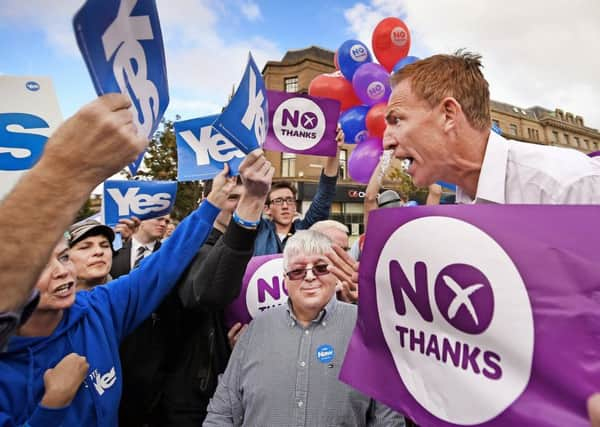Darren McGarvey: Cybernat, Yoon or Remoaner '“ pick your prejudice


At every level, from our personal relationships to our communities and politics, we’ve skilfully concealed our basest tribal impulses behind a veil of political enthusiasm to disguise the fact we deeply resent one another, not only for the way we voted, but for the entire intellectual interior of that political decision.
‘Yoon’, ‘Cybernat’, ‘Remoaner’, ‘Social Justice Warrior’, ‘Brexiteer’ – the list keeps growing.
Advertisement
Hide AdAdvertisement
Hide AdWe delude ourselves into thinking that these terms, somehow, helps us understand the world better, that entire sub-sets of people, with varying adherences to a multitude of valid and coherent political ideas, can be reduced by some trendy catch-all pejorative, above which we, the enlightened, exalt ourselves. But who’s enlightened really, when all of us are thinking and behaving like this? Why is that sort of soft-bigotry any different to the language of football hooligans or xenophobes?
You may shriek at the comparison, seeing yourself as a thinking person, but therein lies your problem my friend, because you (and me) are no better than those we often declare imbecilic.
We’ve just chosen to degrade, dismiss and discriminate against a different out-group, in a way we think is wholly justified and more socially acceptable than other forms prejudice. However, this tribal behaviour, upon whoever we unleash it, is ubiquitous and has become an epoch-defining phenomenon which is bringing our world to the cliff-edge of its withering sanity.
Our more educated, socially mobile citizens can cloak these base impulses in a flowery, bloviating verbosity, couched in self-justifying hubris, presenting the like-minded observer, seeking personal validation, with the illusion of clear-thinking. When you call someone a Yoon, a Cybernat or ascribe the annoying traits of a few people on Twitter to entire political movements and ideologies – like feminism, Black Lives Matter, Scottish independence, Unionism, libertarianism, Islam, centrist dads, social conservatives or people who buy the Sun – then psychologically speaking, your brain isn’t working any harder than a skinhead’s.
You are simply intellectualising your prejudice in a self-deluding manner, making it more socially palatable to those who share your values.
We rarely consider the interior of our respective positions, the moral overlap or the common fears we feel besieged by, such as the corrosion of our society as it descends into rhetorical warfare.
A ceaseless conflict of attrition where an entrenched commentariat guide their heat-seeking polemical missiles to their usual targets. This is an utterly frightening dilemma of our time. We have lost the ability, or desire, to speak and listen to each other.
Don’t worry. You are not doing it on purpose. You are not a bad person. Like me, you are simply far less clever and thoughtful than you think you are.
Advertisement
Hide AdAdvertisement
Hide AdTribalism is our modus operandi as a species. If social media has revealed one profound thing about the nature of humanity, other than ubiquitous narcissism, it’s that.
In the early days of our species, we could only see as far as the next meal, the next morning, the next hunt. Tribalism helped us survive in a battle for scarce resources, surrounded by the constant threat of attack, not only from other tribes, but from the other species we’ve now brought to heel by caging them in zoos or rendering them extinct.
Now, we look at the sophisticated civilisation we have collectively built and attribute this to ourselves, when really, as individuals, we have not evolved a great deal, socially speaking.
Today, social media presents us with a panoramic view of what looks and feel like reality, but which is really a distortion of it.
Social media is the disfigured illusion of reality, a lucid dream from which we cannot awake. Today, we see everything happening at once, 24 hours a day.
And just like our tribal ancestors, who created myths, tales and gods to try and explain complexity like the weather and control their developing civilisations, we look to our politicians to superimpose meaning onto what appears to be a gathering snowball of permanent chaos.
Sadly, we have appointed our political class as new tribal leaders to whom we defer.
They are the wise ones who set the agenda as we fan out across social media, fighting for the scraps.
Advertisement
Hide AdAdvertisement
Hide AdA political class which, for all its gifts and noble intentions, is just a flawed as we are because they are humans too, whose entire professional orthodoxy is now to perpetuate the same reductive, tribal juvenilia as the rest of us – because they operate on a supply-and-demand basis.
Despite the hubristic terms in which we often paint ourselves, whether as Scottish or as British or as European, informed or rational, fair and thoughtful, the truth is: this little island has a lot of growing up to do.
People have become deeply invested in the false belief that this tribal warfare, which has utterly toxified the well of political dialogue, will miraculously cease the moment a referendum result, that personally suits them, is finally delivered, wilfully oblivious to the fact that such a shift would merely invert the current circumstances, leaving the other half, the losers, to demand the decision be reversed.
No matter what way you choose to slice it, to suit your own political aspirations, when all of reality is viewed through a referendum’s lens, through which we see only what we want to see, then there will always remain, just under half of the voting population who resent living in a country they did not vote for. The problems we face as a society, and their solutions, are not hinged on the result of referendums. They depend on our ability to be honest about the fact that we, like our primordial ancestors, need to evolve.
Everybody claims to want change, but nobody wants to change.
